
September 20
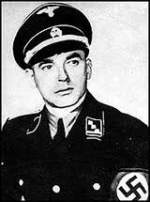
1911 Birth: Alfred Naujocks: SS Sturmbannfuehrer, secret-service veteran and member of the SD since its founding in 1934; is believed to have organized the "faked attack" on the German radio station at Gleiwitz on the German-Polish border on the night of August 31, 1939. After surrendering to the Americans in late 1944, he signed a sworn affidavit at Nuremberg on November 20, 1945, saying he had been given his orders personally by Heydrich and was accompanied during his mission by Heinrich Mueller. Shortly after signing his affidavit, he mysteriously disappeared from custody. He will die on April 4, 1960, a successful Hamburg businessman. [For further details, Click here.]
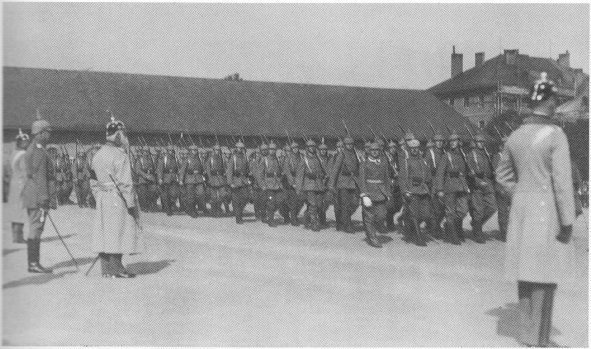
1914 World War I: List Regiment (Sep 1-Oct 7): Infantry Recruit Adolf Hitler's regiment continues a short but intensive basic training program, which is held in the premises of a large public school on the Elizabeth Platz in Munich. Hitler receives the first uniform of his life; basic greenish-grey with an "RIR 16" sown in red unto the epaulettes and a red stripe down the side of the trousers. The trousers are tucked into new leather boots, topped by a thick leather belt around the waist of the uniform jacket. [For further details, Click here.]

1915 World War I: List Regiment: Gefreiter Adolf Hitler's 16 Reserve Infantry Regiment continues to occupy a position, at Fromelles—pictured above in a drawing by Hitler—on a level field with water channels, willow trees and willow stalks; in the distance towards the enemy lines lies an insignificant wood with barbed wire entanglements. Under the direction of their defense-minded commander, Lieutenant General Gustav Scanzoni von Lichtenfels, the regiment works ceaselessly day and night to further fortify their position at Fromelles while fighting off repeated assaults by the enemy. [For further details, Click here.]
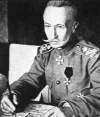
1916 World War I: Various:
Brusilov—slowed by ammunition shortages—reaches the Carpathian foothills. The offensive ends when German reinforcements, rushed from Verdun, bolster the shattered Austrians, who are in danger of being knocked out of the war.
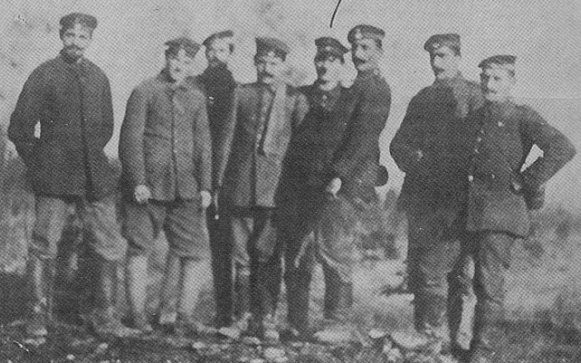
Hitler and his fellow dispatch runners
List Regiment: Gefreiter Adolf Hitler endures trench warfare in Flanders (Artois) with 3 Company, 16 Reserve Infantry Regiment [List Regiment]. [For further details, Click here.]
1917 World War I: Various:
Ypres: A series of British assaults inch forward against determined counterattacks. The Germans, for the first time, use mustard gas, scorching and burning the British troops.
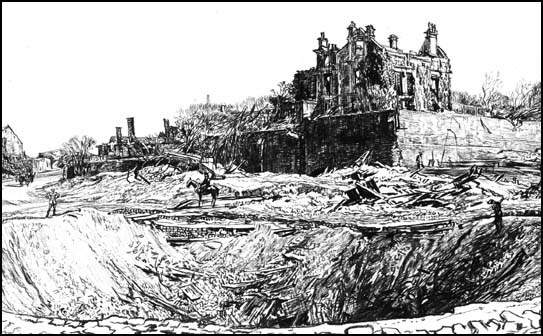
List Regiment (September 11-30): The regiment remains on light duty, guarding a camp near Mulhouse in Alsace, the only section of the front on German soil. During this slow time, not only will Hitler and his comrades get a well-deserved respite from the rigors of trench warfare, but the heavily censored news from the Front seems to be improving as well. The news of the collapse of the Russian Front and the further defeats of Italian arms is, however, tempered by the news that German munitions workers have gone on strike. This mix of events give an impression that the war on the Front is going well, but being undermined by defeatism on the home front. [For further details, Click here.]
1918 World War I: Various:

General Allenby's Report on Fighting at Megiddo:
Our left wing, having swung around to the east, had reached the line of Bidieh, Baka, and Messudiyeh Junction, and was astride the rail and roads converging at Nabulus. Our right wing, advancing through difficult country against considerable resistance, had reached the line of Khan-Jibeit, one and one-fourth miles northeast of El-Mugheir and Es-Sawieh, and was facing north astride the Jerusalem-Nabulus road. On the north our cavalry, traversing the Field of Armageddon, had occupied Nazareth, Afule, and Beisan, and were collecting the disorganized masses of enemy troops and transport as they arrived from the south. All avenues of escape open to the enemy, except the fords across the Jordan between Beisan and Jisr-ed-Dameer were thus closed. East of the Jordan Arab forces of the King of the Hejaz had effected numerous demolitions on the railways radiating from Deraa, several important bridges, including one in the Yurmak Valley, having been destroyed. Very severe losses have been inflicted on the masses of Turkish troops retreating over the difficult roads by our air services. A German airplane, later ascertained to have been carrying mails, landed in the midst of our troops at Afule. The pilot, who believed the place still to be in Turkish hands, destroyed the machine and its contents before he could be secured.
U.S. officer George S. Patton writes home after Saint-Mihiel offensive:
On September 20, 1918, 32-year-old Colonel George S. Patton of the American Expeditionary Force (AEF) writes to his father from the Western Front in France, recounting his experiences during the American-led offensive against the Germans at Saint-Mihiel earlier that month.
Patton had previously served in Mexico in 1916 under General John J. Pershing during the U.S. army's pursuit of Mexican rebel Pancho Villa. The following year, after the U.S. declared war on Germany, the young officer traveled to France as Pershing's aide. At Saint-Mihiel, Patton was put in command of the light-tank brigade. The attack marked the AEF's first major offensive operation as an independent army during World War I, as well as the first time the U.S. had used tanks in battle.
"Dear Papa," Patton began his letter, "we have all been in one fine fight and it was not half so exciting as I had hoped, not as exciting as affairs in Mexico, because there was so much company. When the shelling first started I had some doubts about the advisability of sticking my head over the parapet, but it is just like taking a cold bath, once you get in, it is all right." In the rest of the letter, Patton chronicles his experience in battle alongside a brigade commanded by General Douglas MacArthur (later the commander of all Allied forces in the South Pacific during World War II) and his movement on foot across the battlefield, evading German shells and surveying the damage inflicted by the battle. As Patton finally concluded, "This is a very egotistical letter but intersting [sic] as it shows that vanity is stronger than fear and that in war as now waged there is little of the element of fear, it is too well organized and too stupendous."
Later wounded in the leg by a German machine-gun bullet, Patton was evacuated to a military hospital, where he enjoyed a full recovery. He returned home safe from France, receiving a Distinguished Service Cross and the Purple Heart for his service in World War I. Two decades later, as a general, Patton would play a leading role in World War II, becoming one of the most famous and controversial military figures in U.S. history. (History.com)
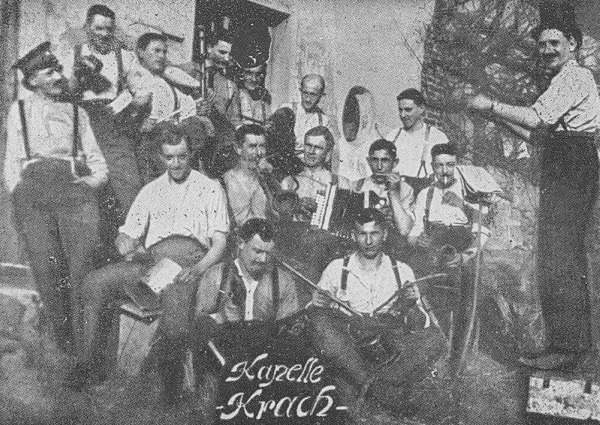
List Regiment (August 21-September 27): Gefreiter Adolf Hitler attends a signals training course in Nuremberg. [For further details, Click here.]
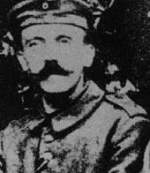
1919 Hitler is ordered by his superior, Captain Mayr, to join the German Worker's Party (DAP)—even though he is still in the army and such an act is technically illegal. Captain Mayr will later write that it was General Ludendorff himself who had come to him and personally suggested that Hitler should be allowed to join the party and build it up. (THP) Note: In Hitler's version, no one orders him to do anything. He claims to have joined the party out of shared ideals, and a sense that he would be able to become a big fish in this very small pond.
1931 Britain comes off the gold standard to stop speculation against the pound.
1935 Nazi Germany: Various:
Nuremberg Laws: Nazi party ideologists give their official interpretation. (THP)
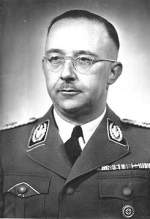
Church and Reich: Himmler issues an order forbidding members of the SS to take any leading role in religious organizations, including the German Faith movement, and strictly forbidding all manifestations of religious intolerance or scorn of religious symbols. (THP)
1936 Holocaust: The Gestapo arrests a number of well-known rabbis and Zionist leaders without charging them with any crimes.
1938 Sudeten Crisis Sep 20-21: The Czech government is forced to accept the Anglo-French 'appeasement plan' after being bluntly informed by representatives of Britain and France that they can expect no help if the Germans attack.
1939 World War II: Various:
Press Reaction to Hitler's Sep 19 Speech:
The most noteworthy feature of Hitler's first speech as a military conqueror is that it contains nothing new . . . . Hitler is still explaining why he invaded Poland. Despite the pleas of President Roosevelt, the Pope and the Oslo Powers, the offers to mediate of King Leopold and Queen Wilhelmina, he is still shouting he sought everywhere for peace and nobody would give it to him.... Hitler scoffs at the folly of those who try to rupture the 'unbreakable ties' between Germany and Italy, or rather between 'myself and Mussolini.' But he still clings to the idea that he can drive a wedge between France and Britain. (New York Times).
Press Reaction to Hitler's Sep 19 Speech:
Some of it reads like a rehash of Mein Kampf with its gibes at the so-called 'Polish State' Proposals which were never communicated in full to any of the Allied Governments now masquerades as the earnest efforts of a zealous seeker for peace. Such a speech calls for a practical and not an argumentative reply."—TheTimes (London)
War in the Air: A German Messerschmitt Bf 109 is shot down by Fairey Battle gunner Sgt. F. Letchard during a patrol near Aachen: the RAF's first aerial victory of the Second World War.
German Ambassador in the USSR (Schulenburg) to German Foreign Office:
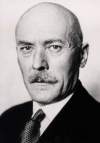
Molotov stated to me today that the Soviet Government now considered the time ripe for it, jointly with the German Government, to establish definitively the structure of the Polish area. In this regard, Molotov hinted that the original inclination entertained by the Soviet Government and Stalin personally to permit the existence of a residual Poland had given way to the inclination to partition Poland along the Pissa-Narew-Vistula-San Line. The Soviet Government wishes to commence negotiations on this matter at once, and to conduct them in Moscow, since such negotiations must be conducted on the Soviet side by persons in the highest positions of authority, who cannot leave the Soviet Union. Request telegraphic instructions.
Poland: German troops in eastern Poland withdraw to the line agreed upon in the German-Soviet treaty of August 26, 1939. The Red Army moves in behind them to occupy the formerly Russian territory.
1940 Countdown to Infamy: Genevieve Grotjan completes the decryption of the Japanese Purple code.
[See: Countdown to Infamy: Timeline to Pearl Harbor.]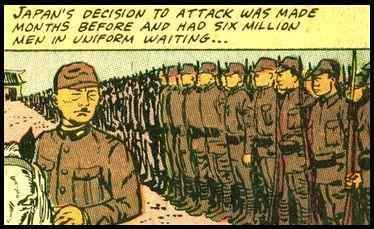
1941 From the Duty Book of Captain Shigeshi Uchida:
Since the 11th, the Combined Fleet's war games were held at the Naval Staff College until today, based upon the draft of the operational plan which was made by NGS. Almost every morning and afternoon I attended. In the result-studying meeting, the ability to supply air strength, especially fighters, became the main issue. (Japan's industrial capacity to do the job was raised in this discussion. The oil-carrying ability of the destroyers was seriously considered. It was decided to carry oil drums.) [Note: In the September war games, Uchida recommends that the attack on Pearl Harbor be launched on a Sunday.] (Dillon)
1943 World War II: Various:
British launch Operation Source:
On this day in 1943, British submarines attempt to sink the German battleship Tirpitz as it sits in Norwegian waters, as Operation Source gets underway. The Tirpitz was the second largest battleship in the German fleet (after the Bismarck) and a threat to Allied vessel movement through Arctic waters.
In January 1942, Hitler ordered the Germany navy to base the Tirpitz in Norway in order to attack Soviet convoys transporting supplies from Iceland to the U.S.S.R. The Tirpitz also prevented British naval forces from making their way to the Pacific. Winston Churchill summed up the situation this way: "The destruction or even crippling of this ship is the greatest event at the present time . . . . The whole strategy of the war turns at this period on this ship."
Attacks had already been made against the Tirpitz. RAF raids were against it in January 1942 failed to hit it. Another raid was made in March; dozens of RAF bombers sought out the Tirpitz, which had been reinforced with cruisers, pocket battleships, and destroyers. All of the British bombers, once again, missed their target.
Sporadic attacks continued to be made against the German battleship, including an attempt in October 1942 to literally drive a two-man craft up to the ship and plant explosives on the Tirpitz's hull. This too failed because of brutal water conditions and an alert German defense. In 1943, the battleship Scharnhorst joined the Tirpitz, creating a threat to Allied shipping that caused all convoys to the Soviet Union to be temporarily halted. Finally, in September, six midget British subs set out to take the Tirpitz down for good. The midgets had to be towed to Norway by conventional subs. Only three of the six midgets made it to their target. This time, they were successful in attaching explosives to the Tirpitz's keel—and did enough damage to put it out of action for six months. Two British commanders and four crewmen were taken captive by the Germans and spent the rest of the war as POWs.
Ironically, the mighty Tirpitz fired its guns only once in aggression during the entire war—against a British coaling station on the island of Spitsbergen. (History.com)
Heeresgruppe Sud begins its withdrawal to the Melitopol-Zaporoshe line.
Italy: The British 8th Army occupies Bari in southern Italy.
Sardinia: German troops evacuate the island.
Field-Marshal Smuts to Churchill:
Death: Guy Gibson: led the Dambusters raid to destroy the Mohne and Eder dams, in a plane crash.
1946 Nuremberg Tribunal: The justices continue to meet to discuss verdicts in the Major War Criminals Trial. (See: 30 September 1946)
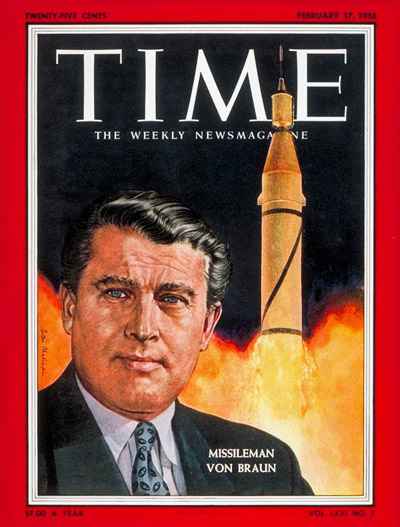
1956: Werner von Braun's team launches the first Jupiter C from Cape Canaveral. Although the nose cone is never recovered, the missile reaches an altitude of 682 miles and a distance of 3,400 miles, a record that will stand for the next two years. [Note: Von Braun, Hitler's former chief rocket scientist, is now working for the US.]
[See: Wunderwaffen: Hitler's Deception and the History of Rocketry.]1997 Death: Erich Hartmann: German pilot nicknamed "The Blond Knight Of Germany" by friends and "the Black Devil" by his enemies, was the most successful fighter ace in the history of aerial combat. He claimed 352 enemy aircraft shot down (of which 345 were Soviet) in 825 combat sorties while serving with the Luftwaffe, Germany's air force, in World War II. Hartmann was forced to crash land his damaged fighter 14 times.
2005 Death: Simon Wiesenthal: Austrian-Polish Nazi hunter: Following four and a half years in the concentration camps of Janowska, Plaszow, and Mauthausen during World War II, Wiesenthal dedicated most of his life to tracking down, hunting and gathering information on fugitive Nazis so that they could be brought to justice for war crimes and crimes against humanity.
Edited by Levi Bookin (Copy editor)
Disclaimer: This site includes diverse and controversial materials--such as excerpts from the writings of racists and anti-Semites--so that its readers can learn the nature and extent of hate and anti-Semitic discourse. It is our sincere belief that only the informed citizen can prevail over the ignorance of Racialist "thought." Far from approving these writings, this site condemns racism in all of its forms and manifestations.
Fair Use Notice: This site may contain copyrighted material the use of which has not always been specifically authorized by the copyright owner. We are making such material available in our efforts to advance understanding of historical, political, human rights, economic, democracy, scientific, environmental, and social justice issues, etc. We believe this constitutes a "fair use" of any such copyrighted material as provided for in section 107 of the US Copyright Law. In accordance with Title 17 U.S.C. Section 107, the material on this site is distributed without profit to those who have expressed a prior interest in receiving the included information for research and educational purposes. If you wish to use copyrighted material from this site for purposes of your own that go beyond 'fair use', you must obtain permission from the copyright owner.
Please Note: The list-owner and moderators of 3rdReichStudies are not responsible for, and do not necessarily approve of, the random ads placed on our pages by our web server. They are, unfortunately, the price one pays for a 'free' website.